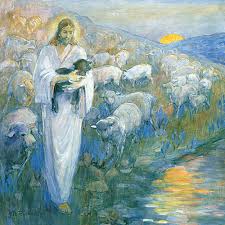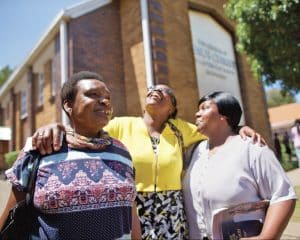I taught Relief Society this Sunday, with a fully broken heart. It was extremely painful, but it was also moving, to be vulnerable before my sisters, and to witness moments of light, and grace, and burden sharing.
It was Ezra Taft Benson’s lesson 20, “Feed My Sheep,” which Suzette previously posted about here.
Introduction
We began by singing “Dear to the Heart of the Shepherd,” as per a good tip from TopHat and her own excellent RS teacher. I told the sisters that my favorite line in the hymn, and the part I wanted to focus on was this: “Make us thy true under- shepherd[esse]s.” Because it is, and was.
President Ezra Taft Benson suggested that
Sisters also have callings of “shepherding” in the charitable and loving service they render to one another, and to others. Thus, we must all learn to be true shepherds. We must manifest the same love to others that the Good Shepherd has for all of us. Each soul is precious to Him. His invitation beckons every member—every son and daughter of God.
After reading this, I asked a few simple questions, and the sisters answered.
Who are the sheep?
The first said simply, “We are.” Two more added, “Our Relief Society.” “Our Ward family.” Still another said, “Everyone.” I agreed. Lambs are like neighbors, and Jesus showed us who the neighbors are, that we are commanded to love as ourselves.
What then, do they need to be fed?
Again, various responses flooded in: “The love of God.” The word of God.” “Not always, but sometimes, real food.” I paused at the last one, because 1) Jesus did this, when he gave loaves and fishes, and recognized that people could not be fed spiritually until they were fed physically, and 2) I’ve experienced it, when my daughter was born, when Mormon Feminism was due to the publisher, and the very night I taught this lesson, though I had no way of knowing it, then.
What if they don’t want to be fed, or the food doesn’t seem nourishing to them?
The first sister to respond answered succinctly, and I believe perfectly: “Love them.” Others gave lengthier, though still thoughtful answers. Of these, one told about consistently visiting teaching a sister for three years who didn’t quite seem to appreciate being visited, but who eventually praised her visiting teachers to one of their husbands, and acted like she hadn’t been annoyed the entire time.
The next expressed gratitude for that approach, but shared another one, of offering space, patience, and respect, as well as a trust in God that saints we might consider less active would be given lots and lots of connections. She referred specifically to her full-time mission service in a very big and very populated Asian country. In just one city she served in, there were approximately 17 million people–1 % of whom were Christian, with a much, much smaller percentage LDS Christian. Even with this, she and her companion ran into less active members all of the time, when statistically it seemed that they shouldn’t run into any. Some of these individuals were interested in returning to church. Many more were not. But, every conversation was good.
Another sister chimed in, “Everyone wants to be fed,” and referred back to the “everyone” that makes up the lambs that we are responsible for. She acknowledged that we can’t feed them everything, but that we can feed them something, even if that something is small (but significant), like a smile, kind word, or hug. The last commenter here agreed. “Just because they don’t want to be fed one part of what we’re willing to offer them, doesn’t mean that they don’t want another part.” She suggested that the first part could be the words of Christ, while the second could be true friendship. She also affirmed the importance of respecting the one we hope to feed.
Together, their words reminded me of my responsibility to feed my toddler, who most certainly doesn’t always want to be fed, and whose doctors are sometimes nervous, because she’s in the first percentile of weight for her age. It means that I offer her lots and lots of different foods, and sit with her while she eats, so she feels my love and sees my example, but that I also sometimes let her eat too many raisins and chocolate chips, because I would rather have her eat them, than nothing.
I invited a woman in my ward I dearly love to read the following quote from President Uchtdorf, that I also dearly love (and that I was reminded of by TopHat’s recent post). She read with the most powerful and heartfelt voice. I couldn’t keep from crying. Even though I was the one who asked her to read it. Even though I knew what the words said.
The search for truth has led millions of people to The Church of Jesus Christ of Latter-day Saints. However, there are some who leave the Church they once loved. One might ask, “If the gospel is so wonderful, why would anyone leave?”
Sometimes we assume it is because they have been offended or lazy or sinful. Actually, it is not that simple. In fact, there is not just one reason that applies to the variety of situations. Some of our dear members struggle for years with the question whether they should separate themselves from the Church.
In this Church that honors personal agency so strongly, that was restored by a young man who asked questions and sought answers, we respect those who honestly search for truth. It may break our hearts when their journey takes them away from the Church we love and the truth we have found, but we honor their right to worship Almighty God according to the dictates of their own conscience, just as we claim that privilege for ourselves.
Some struggle with unanswered questions about things that have been done or said in the past. We openly acknowledge that in nearly 200 years of Church history—along with an uninterrupted line of inspired, honorable, and divine events—there have been some things said and done that could cause people to question.
Sometimes questions arise because we simply don’t have all the information and we just need a bit more patience. When the entire truth is eventually known, things that didn’t make sense to us before will be resolved to our satisfaction.
Sometimes there is a difference of opinion as to what the “facts” really mean. A question that creates doubt in some can, after careful investigation, build faith in others.
And, to be perfectly frank, there have been times when members or leaders in the Church have simply made mistakes. There may have been things said or done that were not in harmony with our values, principles, or doctrine. (“Come Join With Us,” October 2013)
We didn’t read the following quote from President Rosemary Wixom, about a young sister, but if we had more time, we would have:
In spite of her substantial support system, she became less active. She said, “I did not separate myself from the Church because of bad behavior, spiritual apathy, looking for an excuse not to live the commandments, or searching for an easy out. I felt I needed the answer to the question “What do I really believe?” (“Returning to Faith,” April 2015)
I asked an additional question, and let the sisters speak.
Why are we worried about people who are less active?
Expectedly, the themes revealed were love, care, and concern.
From there I hoped to talk about two specific case studies (one real and one imagined). I did, but much briefer than planned. Instead of asking the sisters to discuss them, I simply asked them to consider them.
The first (real) story was about a very big-hearted woman I know who lives in a predominantly Mormon town in Utah County. She has a few visible tattoos that are deeply meaningful to her, and fairly bravely for her area, occasionally wears sleeveless shirts (so tempting–I know!). In her professional setting, she has had several clients say unkind things to her, about her Mormonism, or lack thereof. Because she is professional (and also kind), she does not say all of the things she might like to in response, but has sometimes found herself saying this: “My father is a Mormon bishop, and he has never said the things to me that you just said.”
How would we talk to her instead, so she would come away from the conversation feeling loved instead of judged? It is essential to share Christ’s love in a way that feels loving to the other person involved.
The second (imagined) case study could also be quite real. How would you respond to someone you’re visiting teaching, who tells you they no longer want to come to church? What would your words be, and with what tone and body language? Here, as before, we need to find a way to express the love, care, and concern that are our motivators.
Thankfully, Jesus offers an example. John 10:3 states, “The sheep hear his voice: and he calleth his own sheep by name, and leadeth them out.” At the simplest level, he knows his sheeps’ names. At another, he knows them. This takes listening, and seeking understanding. It takes remembering that each sheep is an individual who needs to be loved. This is what qualifies us to be Christ’s true under-shepherdesses.
President Benson reminded us that people need “real, heartfelt concern from a true and loving shepherd.” President Silvia Allred agreed: “Our service should be” done “with our hearts full of love of God and his children. There must be genuine concern to shepherd the flock, to invite them unto Christ” (“Feed My Sheep,” October 2007.) There should be no ulterior motive, period. There should only be sincerity and love, which are two of the most powerful tools.
One additional reason we wish to reach out, is simply that we are better together–we become a more complete body of Christ. As President Benson taught, “We will all be more fitly joined together.”
Conclusion
Sometimes people need to be fed and cared for who we might not readily assume. These may be individuals in the pews with us, rather than just without. And like those out of the pews who we are striving to love, who may have genuine reasons for choosing distance, those with us may also have genuine reasons for feeling hurt, sad, or confused. Such sheep also need care. President Allred affirmed, “We can relieve spiritual hunger and feed the sheep.” It “might mean strengthening and nourishing the new members, the less active, or even the fully active members” (“Feed My Sheep“).
Elder Jeffrey R. Holland recently came to my stake, and spoke about broken things, broken people, and broken hearts. He encouraged us to bring our brokenness to church with us. I reminded my Relief Society sisters of this, and told them that I did it, that I was standing before them, with a badly broken heart. And then I told them why.
Two new policies were added to the bishop’s handbook last week. The first stated that those in same sex marriages are apostate, and would mandatorily be called in for disciplinary counsels. For me, that felt painful enough. The second policy stated that children with parents in same-sex relationships would be excluded from naming blessings and baptism before the age of 18, at which point they would have to disavow their same sex parent’s relationship.
I cried as I told them about friends I have who entered marriages and bore children with individuals who later came out as gay, and how while some stayed in the marriages and some did not, all are wondering what this means for their families. I told them that there were a brother and sister in our ward, whose niece may no longer be able to be baptized this winter, in the same service with her cousin, like she had planned, how there are at least four members in our ward with gay siblings, and how I have a gay cousin, that I happen to share with another member of our ward.
I said that there are many local individuals who are hurting because of this, whose families and friends will be affected directly, and who need to be fed. It is our job to share the master shepherd’s love, to listen to them, and to seek to understand them. For all who want to return to us, or for all who want to remain with us, it is our job to make room for them, in all of their brokenness.
At some point in all of this, I told my ward sisters that I didn’t expect them to agree with me, but that I did expect us to love each other, and to try to find a way to go forward, together. As I looked at them, through my tears and my words, I saw some of them crying, too.
I closed in the name of Jesus Christ, and a prayer was said. After that, I was hugged. I was told, “I love you.” I was told, “I want to bring you dinner tonight.” And then on Tuesday morning, a sister showed up at my door, and simply said, “I’m sorry,” two times in a row, because there was nothing else to say.
It felt holy, and like the very, very beginning of healing. I pray that those hurting (especially, especially, those more directly impacted than I) will be met with the same levels of support and kindness.







7 Responses
Thank you! This is what I have longed to hear. This is the response that gives me hope. I don’t want to walk away from the gospel that I believe with all my heart, but I am heartbroken over the new policy especially after Elder Holland’s talk at conference. I thought we were moving forward. Then this. I have to believe that these tragic burdens will result somehow in blessings. I have to have that hope.
Thank you. It would be wonderful if you could take this lesson on the road. All wards need this!
Beautiful.
Thank you. I needed this lesson. I am so thankful for your ward.
Thank you, Rachel, for your big-hearted courage.
What a beautiful lesson Rachel! I love the part about still feeding people who don’t want to be fed in one way but still need nourishment in another way, and I love how you compared that to your daughter’s need to be fed in a way that works for her. Too often I think we assume that if a person doesn’t take what we offer them, they don’t need anything. Your analogy beautifully shows how wrong it its to say they rejected what I offered them so I’m not going to feed them at all. I love the response that you got from the sisters of your ward. What a beautiful space Mormonism could be for many broken souls if we all responded that way. Thank you for sharing your powerful lesson with us.
Every child is precious. Every child deserves the comfort and companionship of the Holy Spirit of our Lord. I believe this. I believe this policy still hurts children, even now with these changes. And if it only targeted one child that would still be one child too many.
What can I do? How can I show my love while still voicing my opposition?
The church humanitarian aid is always accepting handmade quilts in all sizes. What if I made a RAINBOW quilt and sent it to them? What if I did this to show my love for the children and their parents who are still suffering from this policy? I know my quilt wouldn’t go to them, but God would know why I made it. We believe in vicarious work in our church, maybe someone else could feel of my love and maybe some how God could work it out. Maybe if others made Rainbow quilts someone would see and know that we are not blind to their pain.
If y’all think this is a good idea please use BCC to get the idea out there. If you feel that this is not in good taste, I respect y’all. I respect y’all am very grateful (despite Newsroom grumpiness) that y’all are here.
Apologies Exponent friends. I’m writing this through my tears and am a little addled. I love you and respect you here at The Exponent. YOur specific stories of women and families affected by this policy have touched me deeply this past week. I admire y’all. Thank you!